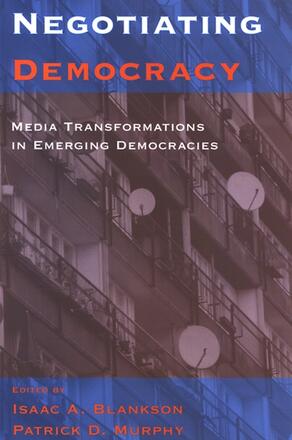
Negotiating Democracy
Media Transformations in Emerging Democracies
Alternative formats available from:
Explores the relationship between media and democracy against the broader background of globalization.
Description
Negotiating Democracy addresses issues that have defined the challenges and consequences of media transformation faced by new and emerging democracies. These issues include the dismantling of national broadcasting systems, the promotion of private independent and pluralistic media, the clash between liberal democratic and authoritarian political traditions, negotiations about the appropriate broadcast language, and the potential for free press and for freedom of speech. The contributors use examples from countries such as Cambodia, Bulgaria, Iran, Nigeria, and Taiwan to not only provide detailed analysis of regional and/or nation-specific cases of media, but also to identify transnational patterns that help deepen the understanding of the media's role in globalization.
At Southern Illinois University Edwardsville, Isaac A. Blankson is Associate Professor of Communication and Public Relations and Patrick D. Murphy is Professor of Mass Communications. Murphy is the coeditor (with Marwan M. Kraidy) of Global Media Studies: Ethnographic Perspectives.
Reviews
"Much of the material here identifies new points of discussion and ongoing lines of further investigation … With the continuing development of technology, people's access to it, and the desire of governments to control that access, the stories of this book linking media and political structures in and across nations and regions in a globalized and globalizing world will continue to be elaborated and enacted for some time." — Russian Journal of Communication
"…brings together a varied collection of analyses of ongoing changes in media, politics, and policies." — Political Communication
"…[the authors] have assembled an immense amount of data and provided careful sociological interpretations and historical presentations. The fourteen contributors find a disturbing world, while probing human resilience against obscurantism and authoritarianism. The usefulness of this book is unquestionable." — H-Net Reviews
"I like the inclusion of the wide and diverse selection of nations, all the more so because most of them aren't 'the usual suspects.' Most of the contributors are relatively new, fresh voices in the field and in a good position to present new perspectives. The topic is highly significant, very important, and as yet has not been addressed in this particular form." — Donald R. Browne, author of Ethnic Minorities, Electronic Media and the Public Sphere: A Comparative Approach
"This book provides rich, interesting historical and very useful contemporary descriptive material. The cases illustrated show a nice variety of primary concerns, from private media monopolies in Guatemala and Bulgaria, to media globalization in Bulgaria, to press freedom and media democratization." — Joseph Straubhaar, coauthor of Media Now: Understanding Media, Culture, and Technology